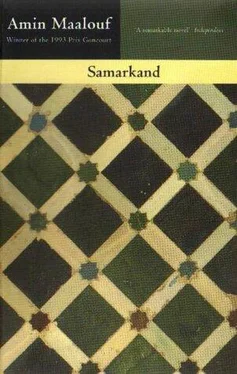To loose himself from the world, create a void around his person, surround himself with walls of stone and fear — such seems to have been Hassan Sabbah’s demented dream.
However this void started to stifle him. The most powerful kings have jesters or jovial companions to lighten the oppressive atmosphere which surrounds them. The man with the bulging eyes was incurably alone, walled up in his fortress, shut up in his house, closed to himself. He had no one to talk to, only docile subjects, dumb servants and awestruck disciples.
Of all the people he had known, there was only one to whom he could still talk, if not as friend to friend then at least as man to man and that was Khayyam. He had thus written him a letter in which despair disguised itself behind a thick façade of pride:
‘Instead of living as a fugitive, why do you not come to Alamut? Like you, I have been persecuted but now it is I who persecute. Here you will be protected, looked after and respected. No emir on earth will be able to harm a hair of your head. I have founded a huge library where you will find the rarest works and will be able to read and write at leisure. In this place you will find peace.’
Since he had left Isfahan, Khayyam had been leading effectively the existence of a fugitive and a pariah. When he betook himself to Baghdad, the Caliph forbad him to speak in public or to receive his numerous admirers who presented themselves at his door. When he visited Mecca, his detractors sniggered: ‘A pilgrimage of servility!’ When, on his return, he passed through Basra, the sons of the qadi of the city came to ask him, in the politest of terms, to cut short his stay.
His fate then was unsettling in the extreme. No one contested his genius or his erudition; wherever he went large groups of intellectuals gathered around him. He was questioned on astrology, algebra, medicine and even religious problems and he was listened to warmly. However, without fail, a few days or weeks after his arrival, a clique would emerge and would disseminate all sorts of lies. He would be called an infidel or a heretic, and his friendship with Hassan Sabbah would be recalled. Sometimes the accusations of being an alchemist, raised against him of old in Samarkand, were dredged up. Ardent opponents were sent to break up his discussions and those who dared shelter him were threatened with reprisals. Usually, he put up no opposition. As soon as he felt the atmosphere become uncomfortable he would feign illness in order not to appear in public again, and he would then not linger, but would go away to somewhere new where his stay would be just as short and precarious.
Honoured and cursed, with no companion other than Vartan, he was constantly in search of a roof, a protector and a patron too; the generous pension which Nizam had allotted to him was no longer being paid out since his death and he was forced to visit princes and governors and prepare their monthly horoscopes. However, even though he was often in need, he managed to get himself paid without bowing his head.
It was told that a vizir, astonished to hear Omar demand a sum of five thousand golden dinars, remarked:
‘Do you know that I myself am not paid that much?’
‘That is quite normal,’ retorted Khayyam.
‘And how so?’
‘Because there is only a handful of intellectuals like me every century, while one could name five hundred vizirs like you every year.’
The chroniclers state that the man found this extremely amusing and went on to satisfy Khayyam’s demands, courteously recognising the correctness of such a haughty equation.
‘No Sultan is happier than I, no beggar sadder,’ Omar wrote during this period.
The years passed and we find him again in 1114 in the city of Merv, the old capital of Khorassan, still famous for its silks and its ten libraries, but deprived for some time now of any political role. To restore some lustre to its tarnished court, the local sovereign was trying to attract the celebrities of the time. He knew just how to seduce Khayyam — by offering to build him an observatory identical to that of Isfahan. At sixty-six years of age, Omar no longer dreamt of anything else and he accepted with adolescent enthusiasm and set right down to work on the project. Soon the building was rising up on a hilltop in the district of Bab Senjan in the middle of a garden of daffodils and white mulberries.
Omar was happy for two years and he worked feverishly. We are told that he carried out astonishing experiments in weather forecasting, his knowledge of the sky allowing him to note exactly the changes of climate over five successive days. He also developed his mathematical theories which were way ahead of his time. It was not until the nineteenth century that European researchers recognized him to be the brilliant precursor of non-Euclidean geometry. He also wrote rubaiyaat , stimulated, we must believe, by the outstanding quality of Merv’s vineyards.
For all that, there was evidently a negative side. Omar was obliged to be present at endless palace ceremonies and to pay homage solemnly to the sovereign at each feast, whenever a prince was circumcised, upon the sovereign’s return from the hunt or the country, and to be in frequent attendance at the diwan , ready to utter a witticism, a quotation or a fitting verse. These sessions exhausted Omar. As well as the impression of having put on the skin of a performing bear, he was always aware of losing precious time at the palace which he could have turned to better use at his work table, not to mention the risk of unpleasant encounters.
Like the one which took place that cold February day, when someone picked a memorable quarrel with him over a youthful quatrain which had fallen into jealous ears. That day the diwan was packed with beturbaned intellectuals and the monarch was overjoyed as he blissfully contemplated his court.
When Omar arrived, debate was already raging on a subject which fascinated the men of religion: ‘Could the universe have been created better?’ Those who replied ‘yes’ laid themselves open to accusation of impiety since they implied that God had not taken sufficient care over his work.
Those who replied ‘no’ were also open to accusation of impiety, as they were giving to understand that the Almighty was incapable of doing better.
They were in hot discussion, with much gesticulating. Khayyam was happy absent-mindedly to watch everyone’s expressions. However a speaker called him, heaped praise upon his erudition and asked for his opinion. Omar cleared his throat. He had not yet uttered a single syllable when the grand qadi of Merv, who had never appreciated Khayyam’s presence in his city, nor the considerations constantly shown to him, jumped up from his place and pointed an accusing finger at him.
‘I did not know that an atheist could express opinions on the questions of our faith!’
Omar gave a tired but worried smile.
‘Who gives you permission to treat me as an atheist? At least wait until you have heard me out!’
‘I have no need to hear you. Is it not to you that this verse has been attributed: “If You punish with evil the evil I have done, tell, what is the difference between You and me?” Is not the man who puts forward such words an atheist?’
Omar shrugged.
‘If I did not believe that God existed, I would not address Him!’
‘But you would address him in that tone?’ sniggered the qadi .
‘It is to sultans and qadis that one must speak with circumlocution — not to the Creator. God is great, he has nothing to do with our airs and graces. He made me a thinker and so I think, and I give over to him the undiluted fruits of my thought.’
To murmurs of approval from those present, the qadi withdrew, uttering dire threats. When he had stopped laughing, the sovereign was beset with worry, fearing the consequences in certain quarters. As his expression became gloomy his visitors hurried to take their leave.
Читать дальше












